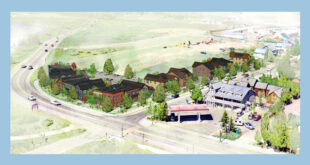No one wants it to be “us vs. them”
By Mark Reaman
Understanding that a lot of outreach and discussion will be needed to convince certain segments of the community to support a local tax on empty houses in town, the Crested Butte Town Council decided on Monday to continue the conversation to see if such a tax is feasible.
They want to gather public feedback from all segments of the community and delve into the details of how the tax could work before putting it to the voters as early as next November.
Council members said they had received both positive and negative feedback on the initial idea of implementing an excise tax on houses that are not occupied by permanent residents. The revenues would be used for affordable housing or climate change mitigation projects. Staff told the council that based on research, not many places aside from Oakland, California and Vancouver, Canada have such a tax and that a voter-approved excise tax of a flat amount per house would be the best avenue for Colorado.
Town statistics indicate that while house prices are increasing dramatically, income levels are stagnant, so the opportunity to purchase a house in Crested Butte is disappearing for most working locals. That is leading to more houses in Crested Butte being owned by people who use them for vacation homes or short-term rentals. While the tax is intended to both raise revenue and perhaps incentivize people to use the houses as a primary residence or for long-term rentals, the council admitted the likely outcome is more money for affordable housing and minimal behavioral change.
Town staff estimated there are about 416 homes that could be tagged as non-primary residences and subject to the tax.
Mayor Jim Schmidt said he saw a lot of negatives with the idea since it could produce ill will from a segment of the second home community that has contributed to Crested Butte. “I’ve already gotten a lot of calls on this,” he said at the December 2 meeting. “I still have a lot of trouble getting around it. I doubt it will get people in houses as permanent residents, but it will raise money. We have an excise tax on short-term rentals.”
“And it doesn’t seem to have stopped the STRs,” said council member Mallika Magner.
“At the time I didn’t think the 5 percent tax on STRs was enough,” added council member Will Dujardin. “People are certainly reaching out over this and it is uncomfortable for some of them, which is understandable. The people I talk to support it or at least support seeing if it can be used as a mechanism to raise money for housing. As for the concern that this will make an ‘us versus them’ attitude, there is already a lot of that. It started when house prices went up and incomes stayed stagnant. We need to expand the money pool for affordable housing. I know second homeowners are important to the community. I know our constituents need affordable housing. I know we need to do our homework and keep the conversation going to see if we can figure it out.”
“I would like to see the conversation continue,” agreed Magner. “I don’t see it as an ‘us versus them.’ Second homeowners need workers to do the services they want and those workers need to be housed. They may not come back here if the restaurant they like is closed because it can’t find workers. So I think we should be able to bring our valued second homeowners to the understanding that this benefits them. With the average house price in town at $1.5 million, I don’t think this would dissuade anyone from buying a second home. This could generate a significant amount of revenue. I would like more data and more analysis on how it could work. Let’s keep talking about it.”
“That’s where a thorough public process would come into play,” said Dujardin. “What’s the magic number for the amount of tax and the magic number for how many days a house needs to be vacant to be taxed? There is a lot of conversation to have.”
Town manager Dara MacDonald said town would have trouble determining how many days a home was not occupied but could determine if a home was owned by a permanent resident.
Council member Laura Mitchell said she too felt the conversation was worth continuing, and then letting the voters decide.
Schmidt pointed out that it took council about a year and a half to figure out the proper STR tax.
“We need to communicate with everyone that is impacted, including the second homeowners,” said council member Mona Merrill. “We need a dialogue.”
Citizen Kent Cowherd suggested the council consider the same vacancy tax on commercial properties.
Local property manager Steve Ryan said such taxes ultimately do have impacts and used the STR tax as an example. He said it is getting more and more expensive to short-term-rent in Crested Butte because of added taxes and fees, and fewer people are lining up to rent in town. He said while the occupancy of STRs has not decreased, the trend is that fewer people are looking at short-term-renting inside town.
Ryan said where there was once a waiting list to rent a home in Crested Butte, that is no longer the case. He said more people are renting on the mountain and spending less money. “There is not a big drop in occupancy but there is a drop in interest,” he said. “That’s a disturbing trend, especially in such a good economy. These kinds of fee increases make a difference. It is not a simple discussion.”
“I would like to see us explore this and get groups together from all sides to look at it,” said Dujardin.
“Not all of them but many, many second homeowners have contributed a lot to the community,” reiterated Schmidt.
“And this is a way for them to do more,” responded Magner.
“We can try to find the balance and common ground,” said Dujardin who suggested council hold a public work session to delve into the idea and then possibly organize subcommittees that explore the pros and cons. “We can follow some of what we did with the Climate Action Plan.”
“I like the idea of going to the people instead of waiting for them to come to us,” said Merrill. “We can go to the property managers, the homeowners and HOAs to get feedback.”
“We all appreciate our second homeowners. It’s not at all an ‘us versus them.’ It is a way for them to contribute to helping to solve the ills we are facing. It is great for us to explore this and see what the public will say,” concluded Magner. “They will make the ultimate decision.”
The concept will be discussed again at the January 6 council meeting.
 The Crested Butte News Serving the Gunnison Valley since 1999
The Crested Butte News Serving the Gunnison Valley since 1999




